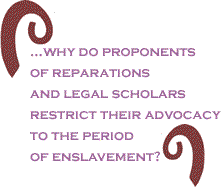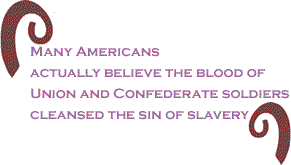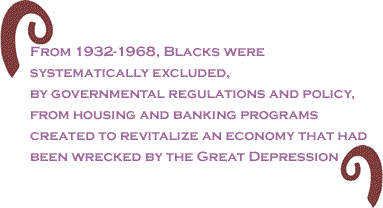
|
||||||||||||||||||||||
 |
||||||||||||||||||||||
 |
||||||||||||||||||||||
 |
||||||||||||||||||||||
 |
| The current issue is always free to everyone |
|
|
 |
| Prior to the current mortgage crisis, the median wealth of a White family was $88,000.00, the median wealth of a Black family was $5,900.00. The forthcoming evidence proving the Federal Governments’ role in producing this startling statistic will be overshadowed by the controversy over the truthful statements of Rev. Jeremiah Wright and subsequent division in the Black community over color blindness and culpability. It appears the color blind faction will prevail as their membership explodes with the congregants from the churches of Obama, Davis, Booker, Patrick and other Ivy-league preachers. Members are being baptized in droves. Never in the history of the Black community have we seen so many answer the call to hope, with all supplicants expressing faithfulness and devotion to the color blind ideology. The
flock has been unwittingly seduced into believing
Economic
injustice and discrimination against Blacks date back to the
beginning of My
argument is that we can look at any point along the continuum
since the ratification of the constitution and observe economic
discrimination against Blacks. Notwithstanding the spiritual
argument, why do proponents of reparations and legal scholars
restrict their From a legal point of view, the following are some of the reasons courts have refused to grant plaintiffs reparations based upon what occurred during slavery (lost wages and unjust enrichment). The courts have consistently cited three reasons why Blacks are unable to receive reparations: 1) statute of limitations; 2) political question; and 3) causation. Any of the three barriers is a reason to dismiss a case but the strong cases generally will overcome two of the three challenges. According to one reparation attorney, the statute of limitation hurdle will be difficult to overcome and depending on the defendant, causation may present a challenge. 1. Statute of limitations: Courts have said too much time has elapse between the time the injury occurred and filing of the suit. 2. Political question: In our system of jurisprudence there is a theory that some issues are outside the scope/purview of the court and the issues are best resolved by the executive and/or legislative branches of government. The courts have concluded reparations/slavery is one of those issues. 3. Causation: A sometimes dubious and vague concept but succinctly, it is the relationship or behavior between the accused and the aggrieved. In the last reparation case the court said the plaintiff failed to show a relationship between the injury and the behavior of the defendants.
Outside
the context of slavery, there were many other instances of economic
discrimination that led to the conditions of wealth disparity
we have today. We can start with the land grant of 1785 whereby
the government sold land for the purchase price of $1.00 an
acre with a minimum of 640 acres. Or the land grant of 1862
which required grantees to farm the land for 1 year. Blacks
were excluded from these allocations of resources that later
turned out to be a foundation for wealth creation for many American
citizens. More recently, Blacks were excluded from one of the
most robust wealth building activities in the history of Most of the wealth families have (excluding those in the upper income bracket) is in the equity found in their homes. Homeownership was greatly expanded from 1934-1968. However, the policies of the federal government through the Federal Housing Administration (FHA) and the Federal Home Loan Bank Board (FHLBB) prevented Blacks from purchasing homes or equally as oppressive, enforced policies that dictated where Blacks could purchase homes. The government, in clear violation of the 14th Amendment to the Constitution, provided a benefit to Whites through very liberal housing policies while impeding Blacks from accessing the same benefits. Prior to 1934, borrowers had to put 60% or greater down to purchase a home. So if a home cost $5,000.00 the borrower had to put $3,000.00 down. The remaining balance of $2,000.00 was an interest-only loan for 3-5 years. This made homeownership unaffordable to many citizens as well as economically imprudent. As an interest-only product, the loan did not amortize and at the end of the term there was a balloon payment of $2,000 plus cost, before the borrower could take title (ownership). If the borrower could not pay the $2,000-plus, the other option was to refinance and start the cycle over again. The risk to the borrower in this type of transaction was, they could be in the cycle for years. An unforeseen event could occurred (job loss, illness, etc.) and the bank could called in the loan. All the money paid on the property would be lost, along with the home. This type of transaction was common prior to FHA and FHLLBB. However in 1934, Congress passed the National Housing Act, which created the FHA, to implement a housing program that would stimulate the economy after the depression. FHA guidelines required a 20% down payment with the loan to be paid over 20 years at a fixed interest rate. More importantly, after 20 years the home was paid off.
These changes made homeownership affordable as well as a great investment. Homeownership in 1900 stood at 46.5%. Thirty years later in 1930 the rate was 47.8%. The increase was only 1.3% but if you look at the next 30 years, by 1960 the homeownership rate was 61.9%, an increase of 13.1%. At no other time in the history of this country, during a 30 year span, has there been such a significant increase in the homeownership rate. Even with the introduction of exotic financial products during the last decade, the homeownership rate since 1960 has only increased by 7%. Unquestionably, the amazing growth in homeownership during this period (1934-68) had its origins in the shift of housing and banking policies. Similar to what we witnessed during the housing bubble from 2002-2006, there was a change in the underwriting guidelines in 1934 which made homeownership accessible. But unlike this recent housing bubble, the explosive growth in homeownership experienced immediately after the depression was putrefied with Jim Crow. To be continued. BlackCommentator.com Guest Commentator, Lloyd Wynn was a consultant in the secondary market. Lloyd is the author of Residential Real Estate Finance: From Application Through Settlement. Click here to contact Lloyd Wynn.
|
Your comments are always welcome. e-Mail
re-print notice
If you send us an e-Mail message we may publish all or part of it, unless you tell us it is not for publication. You may also request that we withhold your name. Thank you very much for your readership. |
|
| April 3, 2008 Issue 271 |
|
| Executive Editor: Bill Fletcher, Jr. |
| Publisher: Peter Gamble |
| Est. April 5, 2002 |
| Printer Friendly Version in resizeable plain text format format |
 |
 |
 |
| |
| |
































